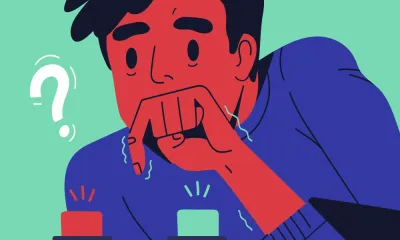It’s almost magical how they appeared in your life. They lavished you with compliments, and it felt amazing to be noticed and appreciated.
The relationship progressed so quickly after you started dating. You neglected your friends and family for them. You started putting them first. Initially, it didn’t happen often, but then they started expecting you to do it every day.
You don’t know where it all went wrong. After a few months, they turned into a completely different person. They were angry all the time, and it was as if you weren't good enough for them anymore.
And then, without looking back, they left.
You were devastated. How many of your friends did you discard for their happiness? How much money did you spend on dates?
While it's easy to blame yourself, you may have fallen victim to the classic narcissistic relationship pattern. Let's break the pattern down:
Things to know
- Narcissists will begin relationships with something known as "love bombing," which can feel like a fairy tale at first.
- Slowly, their manipulative habits will creep in, resulting in you feeling drained or experiencing a decline in your mental health.
- A narcissist will eventually do many things to make you question your value and distance yourself from family and friends. They might try to blame the break-up on you, but it's never true.
Let's delve into the details so you can understand the narcissist relationship pattern more deeply and learn how to recover from it. Here's what I'll cover:
- What Is Narcissistic Personality Disorder?
- How Does A Person Develop Narcissistic Traits?
- What Are The Patterns of a Narcissistic Relationship?
- What Causes Narcissistic Relationship Patterns?
- How Do You Deal With a Narcissistic Relationship?
- Male and Female Narcissists
- Dealing With a Narcissist
What Is Narcissistic Personality Disorder?
Wondering what a relationship with a narcissistic person looks like? Understanding people is tough, especially when mental health disorders are involved. When it comes to Narcissistic Personality Disorder, going through all the information can be intimidating, so let’s make it a little easier.
Narcissistic personality disorder involves
- An attitude and behavior marked by self-centeredness and arrogance.
- Having no empathy or consideration for other people.
- An obsession with admiration

A narcissistic personality disorder is so pervasive it affects a person’s way of thinking and behaving.
No part of a narcissist’s life is spared - from work and friendships to family and romantic relationships. Individuals with narcissistic personality disorder are often described as arrogant, cocky, selfish, patronizing, and demanding.
Low-self esteem
Imagine a lovely red balloon. It floats along happily until someone comes along and pops it. That’s how fragile a narcissist’s self-esteem is.
They walk through life with serious charisma until someone comes along and pops that bubble. Maybe someone comments on their shoes. Perhaps someone hates how their hair looks. Suddenly, their confidence slips away.
Self-importance
Perfectly preened hair, killer cologne, and wrinkle-free clothes. They want to look their best, but don’t we all? What makes their self-importance a narcissistic trait?

It’s that obsessive, laser-like focus narcissists keep on themselves. They want everything to be about them.
What are we having for dinner? How does my hair look? When can I see your place? Did you get my texts? Don’t you love me, babe?
A lack of empathy
You have concert tickets to see your favorite band. It's a date - well, that is until an emergency comes up. Your mother is ill and in the hospital, so frantically you text your partner and ask them to cancel the date. As opposed to showing concern, your partner shows an utter lack of empathy.
“I cleared up my schedule, but okay, whatever.”
As narcissistic partners tend to inflate their sense of self-importance, they lack empathy. They often prioritize their own needs and caring for others is an afterthought.
Defense mechanisms
Defense mechanisms are behaviors people use to protect themselves from unpleasant events, acts, or ideas. These psychological techniques assist people in separating themselves from threats or unpleasant sensations such as guilt or shame.

Individuals with narcissistic personality disorder behave the way they do as a defense mechanism. Narcissists appear confident, but they are extremely insecure. They have low self-esteem, which drives them to look for love and external validation.
This need for love and adoration often results in one-sided romantic relationships that progress into toxic, abusive relationships.
How Does A Person Develop Narcissistic Traits?
Research suggests that narcissistic traits develop in childhood. Narcissists usually have narcissistic parents. While narcissism isn’t genetic, it can certainly be passed down through a narcissistic parent.
Children growing up with narcissistic parents may not see their parents’ behavior as anything strange and may learn to model it.

The disorder tends to reach full maturity in adolescence or early adulthood and results from further damage to normal interpersonal development, such as when a person is:
- Taught manipulative conduct by parents or peers.
- Praised excessively for good conduct and punished excessively for poor behavior.
- Abused or neglected in childhood.
- Surrounded by primary caregivers who were inconsistent or erratic.
- Subjected to excessive expectations in childhood.
- Over-indulged by caregivers, friends, or family members.
- Deprived of genuine criticism which keeps somebody grounded in reality,
- Surrounded by people who are preoccupied with appearance or talents.
What Are The Patterns of a Narcissistic Relationship?
Narcissists usually seek validation from their relationships. Ideally, they want someone accomplished and amazing to see them as worthy of admiration.
After finding someone who matches this expectation, they might adopt the following behavior patterns:
Love bombing
The two of you have just started dating, and things are moving quickly. You can't help but notice how often your partner wants to spend time with you. Dates are happening every evening, and constantly having to entertain them is getting stressful.

This is a tactic called love bombing. It’s used by narcissists to wear their victims down emotionally.
Some examples of love bombing are:
- Showing an excessive need for you every day. They may try to set up an exorbitant number of dates and make your life revolve around them.
- Constantly dropping “I love you” statements and referring to you as their ‘soulmate,’ or other phrases that imply a deep connection.
- Stalking you on social media and trying to invade your online life. It seems like they are everywhere, and you just can’t escape them.
- Making you question your self-worth when you aren’t together. When someone constantly validates you, you may start to feel incomplete without their acknowledgment. Narcissists usually feed this feeling by comparing their victims to friends, family, and past romantic partners.
Manipulative phrases
Narcissists use certain phrases to manipulate their partners
"You’re my soul mate"
One phrase narcissists like to use is the term ‘soul mate’ - a term synonymous with the unity of two people that goes beyond even love itself. This phrase is used quite often as a love-bombing strategy to manipulate you into thinking they are the perfect partner for you.
"I love you"
Another phrase narcissists may enjoy using is “I love you.”
They may pressure you to use the phrase all the time. Once they have conditioned you to say it, they may use it against you. They use ‘love’ as a way to justify their toxic behavior.
The mental health drain

The relationship may suddenly feel like a roller coaster ride you can't escape. As you try to keep up, the relationship becomes increasingly one-sided, further depleting your energy.
Which is exactly what they want.
Gaslighting
You could have sworn it wasn’t date night. So why did your partner come to your apartment crying hysterically? Why did they accuse you of neglecting them? You must have made a mistake, right?
As your mental health continues to suffer, gaslighting becomes a common occurrence. Your partner constantly fabricates incidents and places the blame on you.
The devaluation stage
After the initial euphoria of the love-bombing period fades away, a narcissist's true self emerges. They start to say things that are a complete contradiction to what they once said. They start to devalue the relationship and every other aspect of your life.
Your fashion sense is now horrible, and your 'awesome' hobbies are now unnecessary. Everything they say seems laced with insults.
Their touch becomes a distant memory, and they drift further away from you —all the while blaming you for the sudden shift in your dynamic.
The breakup
The devaluation stage inevitably affects your self-esteem and confidence. You become a shell of the person you once were, and your narcissistic partner starts looking for a new victim.

A narcissistic partner will start to fabricate issues just to break up with you. They will use your strengths against you and call them your weaknesses. Remember, their intention is to destroy you and have you thinking that the relationship's demise is all your fault.
What Causes Narcissistic Relationship Patterns?
Narcissistic supply
Narcissistic supply is the primary reason narcissistic relationship patterns form.
The steady supply of attention and adoration that narcissists require is referred to as narcissistic supply. Maintaining their narcissistic supply isn’t as simple as them going to the grocery store.

It involves spinning a complex web of deception and emotional abuse. Narcissists put on a charismatic front to attract romantic partners. Then, they keep up this front as a means to feed their addiction. When they’ve drained their partners of everything, they discard them to find a new supply.
Needing constant validation
Narcissistic tendencies revolve around receiving validation. This obsessive need for affirmation is triggered when a narcissist’s fragile self-esteem is challenged.
Even the slightest criticism is known to trigger their defense mechanisms. Perhaps someone told them their shoes were out of style. Or maybe someone found their attitude off-putting.
They may suddenly feel insecure and seek validation from their narcissistic supply. To a narcissist, a relationship is just a means to consistent validation. It's this attitude that makes a long-term relationship with a narcissist such a traumatizing experience.
How Do You Deal With a Narcissistic Relationship?
What exactly do you do with this information? Do you go ahead and confront them immediately?

Do you tell all your friends in a panicked phone call at 3:00 AM? Well, probably not the last one. You might want to ask yourself a few questions.
Is my relationship that bad?
Ask yourself these questions to check if you are currently in a narcissistic relationship.
- “Are you setting healthy boundaries for yourself, or are they dictating the terms?”
- “Do they react to slight criticism with an unhealthy amount of egotism or disrespect?”
- “How has your mental health been since dating this person?”
- “Do you feel like there is mutual respect between you two?”
If you answer no to most of these questions, you may be stuck in a narcissistic relationship and need to start the breakup process. Research has shown that breaking up with a narcissist is difficult.
Studies have shown that it takes victims an average of seven breakups to finally let go of a narcissistic relationship.
Check your mental health
Even after a relationship with a narcissist has ended, the negative effects of dating a narcissist will change you.

Just as narcissism can be passed from parent to child, it’s possible for the negative effects of a narcissistic relationship to spill over into other areas of your life and how you treat people.
Preventing a narcissistic relationship from taking over your entire life is a necessity, as you don’t want to start hurting your loved ones. Consider seeing a mental health professional.
Cut off all contact
Ending a relationship with a narcissistic partner may require cutting off all contact. Narcissistic partners are known to berate and insult their exes long after a relationship has come to an end.
You don’t need to wake up to a string of hateful texts or be manipulated into taking them back. Block them on social media, and don’t take any of their phone calls.
Move on
What do you do when the perfect partner turns out to be an emotional vampire? The entire experience can make you question who you date and what relationships are all about.
A helpful tip would be to lean on close friends for support. They could watch out for the early signs of a bad relationship, and it's always helpful to have someone to talk to if needed.

Take some time to heal and reflect on your experiences. When you've separated yourself from the toxicity of a narcissistic relationship, you may start to clearly recognize all the red flags you initially missed.
You can also increase your chances of finding a healthy relationship by trying new dating methods. Try speed dating events or online dating. Doing something that doesn't get you too attached to just one person is a good way to ease yourself back into romance again.
Seek out support groups
If you’re having a hard time coping on your own, it’s probably best to find people who know what you’re going through. Join a support group.
There are plenty of support groups online, so you don’t even need to leave the house. Local support groups may be more suitable if you prefer real-life interactions.
Male and Female Narcissists
The male narcissistic relationship pattern
A key component of relationships with male narcissists is sexual abuse and violence. Male narcissists are way more likely to commit Intimate Partner Violence than female narcissists.
So, along with all the narcissistic tendencies in relationships listed above, sexual and physical violence could also be present if the narcissist in question is male.
The female narcissistic relationship pattern
Though female narcissists are perpetrators of Intimate Partner Violence, they are less violent than male narcissists. Female narcissists are more likely to use covert manipulation tactics to control their victims.
Plus, a defining feature of female narcissists is a victim mentality, which, although also present in male narcissists, is often their main source of power.
Dealing With a Narcissist
A large number of those diagnosed with narcissistic personality disorder are men. Research puts the figure at about 75%. While male narcissism is more common, it’s not uncommon to encounter female narcissists.
Compared to their male counterparts, female narcissists are often overlooked. Female narcissists can be just as vindictive and destructive as male narcissists.

There's a common misconception that narcissism in women doesn't exist; true female narcissists rely on this stereotype to get away with their behavior.
If you encounter a female narcissist, treat her like any other narcissist - set boundaries, proceed with extreme caution, and look out for those same narcissistic love patterns.
Make them aware of their narcissism
Not all narcissists are aware that they are narcissists. Drop hints and see what happens. Avoid accusing them outright. Just lay down the facts about narcissism, and see how they respond.
Be prepared to back off if they react badly. A more subtle approach may be what’s needed to stop that red balloon from popping in front of you. If they seem receptive to your suggestions, give them time to process the information and change on their own.
Confront them
You may need to have an adult conversation with them. Speak your mind about what you’ve been feeling. Try to make them understand that their behavior is toxic

While this may seem like the most obvious route, it may come with challenges. You’re in danger of triggering defense mechanisms such as arrogance and contempt, denial, projection, aggression, and envy.
Remember the red balloon from earlier? All is well until someone comes along and pops it.
Get professional help
Being a victim of narcissistic abuse can leave lasting mental and emotional scars. If you are or have been in a romantic relationship with a person who displays narcissistic tendencies, it might be helpful to see a mental health professional.

Narcissistic relationships have been proven to cause depression, anxiety, and other mental health issues.
Encourage your narcissistic partner to see a professional
Suggest psychotherapy to your narcissistic partner. Working with a licensed therapist can help them increase their empathy and compassion. You should pursue this option if you truly wish to continue the relationship.
However, be realistic about your expectations. Narcissists are generally resistant to change, and genuine change takes time. You are not responsible for a narcissistic partner’s growth or healing. They have to help themselves — and will only do that if they want to.









